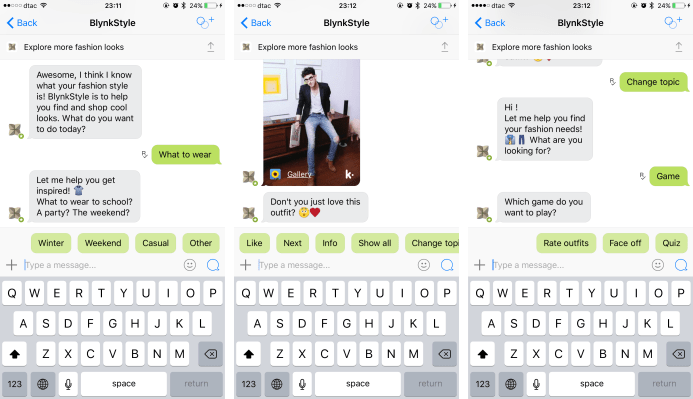This past year something interesting happened in China. Mobile services began sprouting up without mobile apps or websites. Instead these companies — some of which even raised money without a mobile app or website — went straight to WeChat, China’s top messaging app, where they tapped into hundreds of millions of active users across Android and iOS.
Chinese tech trends are distinctly different to North America’s but today, in a move that bears parallels to WeChat-only companies, popular messaging app Kik acquired the small company behind one of the most successful apps (bots) on the Kik service.
Canada-based Kik, which this year raised $50 million from WeChat parent Tencent at a billion dollar valuation, is buying Blynk — the company behind “pocket stylist” bot Blynk Style — for an undisclosed sum. The value of the transaction isn’t important though, the fact that Kik is investing its platform through the acquisition is. (Slack will soon do something similar, but more regimented, after it co-created a VC fund for apps on its platform.)
Blynk’s four full-time employees — including co-founders Jaclyn Ling and Shums Kassam — will move to Kik’s office in Waterloo where, the company said, they “will help us further delve into the world of bots and personal chat assistants on Kik.”
Might that mean future services and products around fashion? That could well be the case over time, although Kik isn’t saying anything beyond that quote for now.
[gallery ids="1254200,1254201,1254202,1254203,1254204"]
Blynk — which offers apps for iOS and Android too — is a good example of what bots, which are programmed accounts which respond to users, can do on Kik. The Blynk bot itself narrows down the kind of fashion a user is into using visual Q&A, it then helps them browse high-street catalogs, and offers other kind of entertainment all of which is hosted inside the Kik app. In other words, users can get an app and web-like experiences without leaving the messaging app.
That kind of immersion is really the key if services like Kik, Snapchat, Facebook Messenger and others are to emulate the success of WeChat in Western markets like the U.S..
Last week, Facebook integrated Uber’s ride-hailing service into Messenger, its boldest move to date towards a WeChat-like platform. Yet, much of the feedback I saw centered around this being a nice but not necessary addition since you can already book Uber via its mobile apps.
Kik, however, is focused in serving a much younger demographic — the company claims that 40 percent of “youth” in North America have a Kik account — in a way that can’t be mimicked elsewhere. Since it has a very focused audience — unlike Messenger, which straddles various ages, demographics and locations — Kik thinks it better knows what types of service that its users want.
That seems to be music — Kik launched a music community service in August — and, with Blynk, fashion. You can imagine, other areas that tap into youth interest like films and perhaps sport. Over time, we may see the company invest in other startup that use its platform and are focused on those areas.
“We’re open minded and we think about how to build the best experience,” Jae Kim, head of strategy and partners, told TechCrunch in an interview. “[If there are] teams that help us to do that and accelerate that, we’re always interested. We see a lot of people building on chat [and] a lot of ways to partner with them.”
The deal, which is more of an acquihire than an acquisition, is the third time Kik has bought a company. It bought GIF Relay in November 2014 and this summer it snapped up GameMix, a startup making HTML5 games for the Kik Messenger platform.
